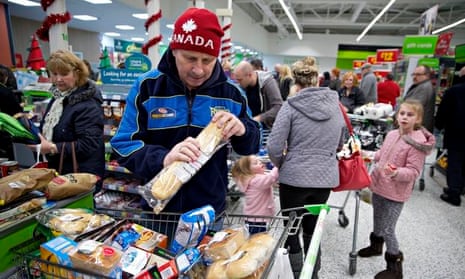After a year of escalating supermarket price offensives, Tuesday – the biggest trading day of the year – is when the defining battle will be fought.
Visa estimates Britons will load £1.3bn on their credit cards as the final Christmas trolley dash gets under way.
The busiest time of day is expected to be between 1pm and 2pm when shoppers will spend almost £1m a minute, or more than £15,000 a second.
At the Asda store in Morley, West Yorkshire – shadow chancellor Ed Balls’s constituency – on Monday, shoppers were already cruising in vain for a spot in its 340-bay car park. The supermarket predicts 3pm on Tuesday will see peak trolley gridlock as people knock off from work at lunchtime and head to the shops.
Indeed, Tuesday’s spend is expected to eclipse so-called Panic Saturday – when consumers are thought to have parted with about £1.2bn, according to the Centre for Retail Research (CRR) – but fall short of 28 November’s internet-fuelled spending bonanza on electrical goods that was Black Friday.
High streets are expected to be much busier on Tuesday because the spending will be done the old-fashioned way – in stores and on foot, rather than online from the sofa.
“It’s the day when disorganised Christmas shoppers panic-buying last-minute presents meet the organised shoppers preparing to buy fresh food for Christmas Eve, Christmas Day and Boxing Day,” said CRR analyst Joshua Bamfield, who estimates 10 million shoppers will be on the move.
Stores could be even busier than expected after some retailers’ internet operations on Monday started to buckle under the strain. Sainsbury’s and Waitrose became the latest household names to admit problems.
On Sunday night, a computer failure meant Sainsbury’s accidentally cancelled hundreds of online orders, with some customers offered redelivery dates – but not until after Christmas.
Waitrose was also hit by IT problems, which staff told customers had put its website “into meltdown”. This led to a series of failed deliveries on Sunday night and Monday morning, with customers given the option to collect their shopping themselves or cancel their orders.
Asda food boss Barry Williams was wearing a jumper decorated with a turkey on Monday – but he is optimistic the chain will not be labelled one when sales are totted up at the end of what is the most important month of the year for retailers.
He hopes his Christmas fare, which includes £10 bottles of champagne and a six-bird roast for £40 (a pigeon in a partridge, inside a pheasant, chicken, duck and turkey) will be tempting enough to prevent shoppers switching to upmarket stores.
Rival Ocado’s six-bird roast, priced at £180, has already sold out. “We used to compete on the price of frozen turkeys,” said Williams. “Now nearly every supermarket sells six-bird dinners.”
This Christmas there is more than usual at stake for the “big four” supermarket chains – Tesco, Asda, Sainsbury’s and Morrisons – after one of the toughest trading periods experienced by the industry in recent memory. The mainstream chains are under siege from the fast growing discounters Aldi and Lidl as well as resurgent Waitrose.
The average British family is expected to spend £821 this Christmas, £1 less than they spent in 2013, according to YouGov. That is largely because spending on food and drink is expected to fall by £6 to £174.
Budgets are stretching further as desperate retailers sell more items on promotion and plunging prices in world commodity markets suppress the cost of key seasonal fare such as turkeys, potatoes, brussels sprouts and even mince pies.
The key battleground items remain poultry, meat, veg, confectionery, booze, fizzy drinks, snacks and party food, says Kantar Retail analyst Bryan Roberts: “The discounters, and Iceland, have made great marketing mileage out of upmarket lines such as lobster, pheasant and multi-bird roasts,” he said. “These might cause some shoppers to visit especially, but overall shoppers are looking to balance out quality and value across the seasonal staples.”
With a third of households likely to shop at Aldi or Lidl this week, the discounters’ success has been good for all value retailers, said Asda’s Williams. “I was brought up in Knotty Ash in Liverpool and this year there will be house parties where they are carving up Serrano ham in the kitchen,” he said of the chain’s £39 legs of jamon, which sold out of within 10 days. “Nothing gives me more pleasure than the democratisation of quality.”
The last-minute rush
£1.3bn is expected to be spent on Tuesday – 84% of that on the high street
Most shoppers will hit the high street between 1pm and 2pm
There will be 53% more shoppers in stores than on an average day
Today is also the most popular day for online food deliveries
About 65m sprouts will be sold this week – and there are more than 100 different varieties
A search for “hate spouts” on Google returns 852,000 results

Comments (…)
Sign in or create your Guardian account to join the discussion